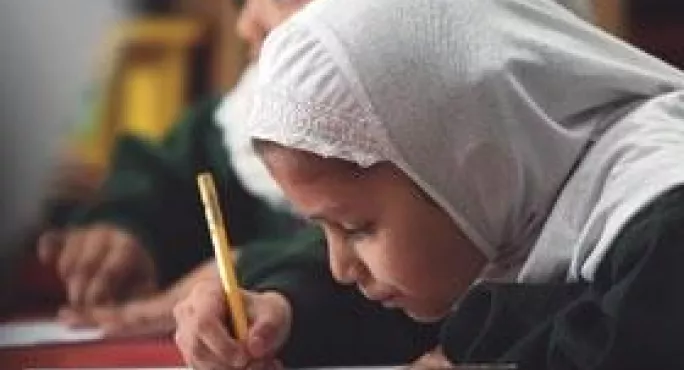We started out in a mosque, ended up in a church

At first glance, Cardiff Muslim Primary seems the same as any other school, with brightly coloured desks, child-sized plastic chairs and pupils’ work displayed proudly on the walls.
But in this multicultural corner of the city, children learn Arabic instead of Welsh, and Islamic rituals punctuate the school day.
Every lunchtime pupils stop whatever they are doing, take out their mats and pray for five minutes.
During the winter, when the sun sets before the end of the school day, there is another call to prayer at around 3pm.
Cardiff Muslim Primary is one of just two Muslim schools in Wales and, ironically, it is based in an old church in the Cathays area.
The independent school started more than 10 years ago with a handful of children in a local mosque. Its numbers have swelled to more than 100. Mrs Clare Fox-Rashed, its head, has her work cut out to create an Islamic environment for her pupils. In the last UK census, just 4 per cent of Cardiff residents were Muslim.
But the school follows most of the same curriculum as state schools, including teaching pupils about three different faiths.
“We teach Islam as many state schools would teach Christianity - as part of everyday life. And then we teach about Christianity and Judaism in RE lessons.”
The Cardiff-born head converted to Islam in 1996 after a trip to Israel where she taught both Jewish and Arabic pupils.
She has since become passionate about Islamic culture and faith, and believes her mixed background is behind the success of the school, which received a positive report from Estyn last May.
“I wanted to make a Muslim school here with a lovely environment of Islam and a family feel, but with the benefits of a state school. Maybe you wouldn’t have that balance with someone who had come from abroad,” she says.
Children learn Arabic from reception. Mrs Fox-Rashed’s own daughter, who is in Year 4, reads and writes the language fluently.
On Fridays, the Islamic holy day, Year 6 boys take it in turns to read the Koran out loud to the whole school.
“Some are very nervous at first, but after a couple of weeks they’re really confident,” says Mrs Fox-Rashed. “It boosts their speaking and listening skills because they have to make sure the whole room can hear.”
Estyn inspectors praised the school’s attitude towards equality. They said boys and girls were given the same opportunities to learn, perform duties as monitors and be part of the school council.
In the playground, girls wearing bright white headscarves skip while boys play boisterous games.
But children are taught to respect Islamic etiquette, including addressing teachers respectfully as “ustadah” for women and “ustaad” for men.
When asked if she feels pupils are being segregated from the local community, Mrs Fox-Rashed says that there is a market for this sort of education: “There’s a need, just as there is for Christian or Hindu schools. Many state schools are brilliant at accommodating Muslim children, but our staff and children are happy they can pray easily here.”
All pupils come from Islamic families, and all the teachers are also practising Muslims, but people of other faiths are welcome to apply - although none has so far.
The school is developing links with nearby Cathays High School, which has a large number of Islamic pupils. It hopes to become one of its feeder schools.
The head takes secondary school transition seriously. She believes that, as long as pupils go to a school that respects their religion, they will not be disadvantaged.
“We are such a family school - children see us outside school in the mosque and I know all their mums and dads personally. Families expect a lot from me and I help in any way I can, even with personal problems. I do a lot of references and help with passports,” she says.
“I wanted to create here what I had as a child: a small community in the city.”
`WALES IS BY FAR THE MOST TOLERANT OF ISLAM’ Year 4 pupils at Cardiff Muslim Primary are studying the history of Cathays, the area of the city where the school is located. They are looking at old maps and hoping to speak to people who used to live there. But Mrs Clare Fox-Rashed, the headteacher, says Islamic culture and religion is the biggest influence. “Their family culture is a massive part of their lives - whether their parents are from Pakistan or Bangladesh - and I think the Welsh culture is not always a part of that. They live Islam every minute of their lives,” she says. Most pupils do not see themselves as Welsh, she says, even though some were born in Cardiff. But despite a recent report by the think tank Civitas claiming that Muslim children feel alienated rather than radicalised, she says pupils do not generally feel threatened. “I have been to England, Ireland and Scotland, and I think Wales is by far the most tolerant of Islam. I think the Welsh Assembly has played a part in that - you are allowed to be who you are.” She says children are constantly aware they are living in a non-Muslim country and are taught to be tolerant of others. “Whatever anybody throws at you, take it - just don’t retaliate. We have to lead by example, and if people don’t like it, you have at least tried your best.”
Keep reading for just £1 per month
You've reached your limit of free articles this month. Subscribe for £1 per month for three months and get:
- Unlimited access to all Tes magazine content
- Exclusive subscriber-only stories
- Award-winning email newsletters



